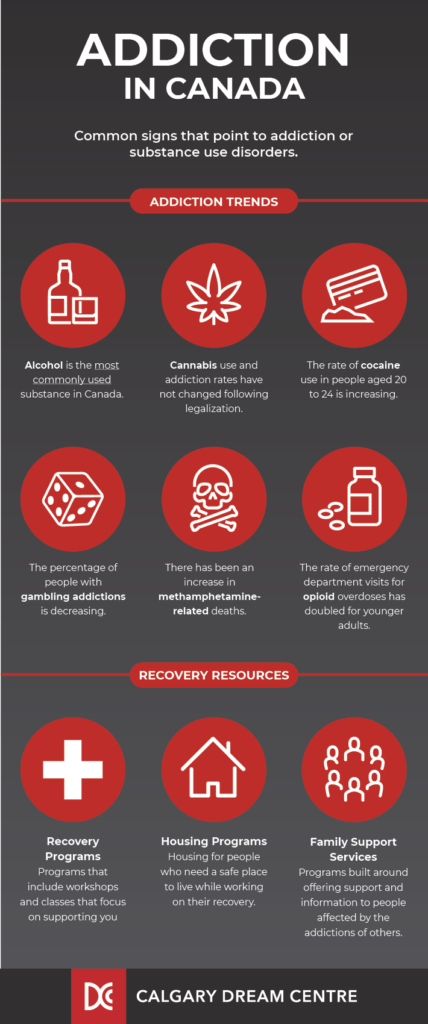The majority of people who use substances such as drugs or alcohol do so to relax or have fun. Unfortunately, for some people, using substances or engaging in certain behaviours can become problematic and may lead to abuse or addiction.
In Canada, approximately 21% of the population (about 6 million people) will experience a substance use disorder or addiction at some point in their lifetime.
According to the Canadian Centre on Substance Use and Addiction, the top addictions in Canada are:
- Alcohol
- Cannabis
- Cocaine
- Gambling
- Methamphetamine
- Opioids & prescription drugs
Keep reading to learn more about the trends of each of the above addictions in Canada.

Alcohol
Alcohol is a legal substance known for its psychoactive properties and is the most commonly used substance in Canada.
Health Impacts of Alcohol
Alcohol is often overconsumed. When overconsumed, alcohol can lead to both health and social consequences. Some of these risks include:
- Short term risks: Intoxication, temporary memory issues, injury, violence, accidents, and overdose
- Long term risks: Addiction, increased risk of cancer, permanent memory issues, heart disease, mental health disorders and social problems
To avoid these risks, Canadians who choose to consume alcohol should follow Canada’s Low-Risk Alcohol Drinking Guidelines.
Alcohol Trends in Canada
Although studies show that the use of alcohol by underage and young adults is slowly declining, 20% of Canadians still consume alcohol above the recommended guideline.
Additional alcohol trends in Canada include:
- Alcohol use has steadily increased among females since 2013
- The use of alcohol is still the most prevalent among adults aged 18-24
- The use of alcohol by underage people and young adults has remained steady in the past few years
Cannabis
Cannabis is a plant known for its psychoactive properties. People use it both recreationally and for medical reasons and consume it in a variety of ways.
Health Impacts of Cannabis
Depending on how cannabis is consumed, it can lead to the following health risks:
- Respiratory and cardiovascular effects
- Over-consumption or addiction
- Mental health disorders
Cannabis Trends in Canada
Although Cannabis was legalized in Canada in 2018, reports show that cannabis use and addiction rates have not increased.
Additional cannabis trends in Canada include:
- Canada reports one of the highest rates of adolescent cannabis use in the world
- About 25% of young people in Canada report having used cannabis in the past year
- 2% of young people report using cannabis every day
Cocaine
Cocaine is an illegal stimulant made from the leaves of the coca plant. It is most commonly used as a recreational drug and can be consumed in various ways.
Health Impacts of Cocaine
Using cocaine is associated with many health risks such as:
- Increased heart rate and blood pressure
- Overdose and addiction
- Sleep disturbance
- Weight loss
- Mental health disorders
- Headaches
Cocaine is commonly used with other drugs, which can further increase the above risks.
Cocaine Trends in Canada
Cocaine trends in Canada include:
- About 2% of Canadians consumed cocaine in some form
- The rate of cocaine use in people aged 20 to 24 is increasing
Gambling
Gambling is a legal activity that many Canadians partake in. Unfortunately, in some cases, gambling can become compulsive and problematic.
Health and Social Impacts of Gambling
Gambling addiction has been linked to :
- Depression and suicide
- Bankruptcy
- Family breakup or violence
These effects can be devastating to the individual as well as the people surrounding them.
Gambling Trends in Canada
Around 75% of Canadians have participated in gambling, but less than 0.7% of Canadians reported having a gambling addiction.
Additional gambling trends in Canada include:
- Gambling addicts in Canada typically lose more than $500,000 a year
- The lottery is the most popular form of gambling in Canada
- The percentage of people with gambling addictions is decreasing
Methamphetamine
Methamphetamine is an illegal synthetic drug known for its psychoactive effects. It is classified as a central nervous system stimulant and can be consumed in a variety of forms.
Health Impacts of Methamphetamine
Methamphetamine use can have severe physiological and psychological effects, including:
- Headaches
- An elevated heart rate and body temperature
- Overdose and addiction
- Psychotic symptoms including hallucinations and delusions
- Cognitive impairment such as memory loss
Statistics on Methamphetamine in Canada
There has been an increase in the availability of methamphetamine across Canada. Additionally, there has been an increase in:
- Methamphetamine related deaths
- Hospitalizations due to methamphetamine overdoses
Opioids & Prescription Drugs
Prescription drugs and opioids are medications prescribed by a health professional to help manage pain and health conditions. Unfortunately, opioids and prescription drugs are often misused for non-medical purposes. This can lead to problematic use and adverse health outcomes.
Health Impacts of Opioids
Like all drug use, overuse can lead to serious health risks, including:
- Vomiting
- Decreased cognitive function
- Decreased respiratory function
- Overdose or addiction
Statistics on Opioids & Prescription Drugs in Canada
Canada is in the midst of an opioid crisis. Opioid use has been a leading public health and safety concern since 2018. Some additional stats regarding opioid use in Canada include:
- The rate of emergency department visits for opioid overdoses has doubled for younger adults
- 9.6% of Canadian adults who used opioid medications reported some form of problematic use
- 22% of Canadians over the age of 15 years old use psychoactive prescription drugs in some form
- Prescription drug misuse is higher among females (14%) compared to males (9%)

Treatment, Support & Recovery
According to a Canadian Centre on Substance Use and Addiction survey, people who are in recovery from addiction almost always do so through recovery programs or community services.
Programs that are available to people struggling with addiction or substance use problems include:
- Recovery programs for both men and women
- Calgary Dream Centre’s Immersion Experience
- Transitional and Community Housing
- Family Support Programs
Recovery Statistics
Recovery from any addiction is a personal journey that looks different for every patient. To understand what recovery looks like, we pulled together some recent stats about addiction recovery in Canada. Highlights include:
- 51.2% reported never relapsing back into active addiction
- 54.2% reported not experiencing any barriers to recovery
- For people who reported barriers to recovery, 54.9% of people said it was because they didn’t believe their addiction was severe enough
If you or anyone you know is struggling with addiction, please contact us today. Our team at the Calgary Dream Centre is dedicated to helping people reclaim their life!



